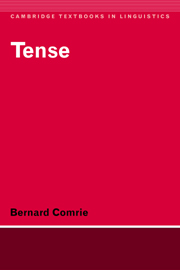1 - Some theoretical and methodological preliminaries
Published online by Cambridge University Press: 05 June 2012
Summary
Scope of the work
The overall scope of this work is to provide an account of tense from the viewpoint of language universals and linguistic typology, that is, to establish the range of variation that is found across languages in tense, and what the limits are to that variation. In chapter 1, first some preliminary remarks are given concerning the notion tense and its relation to time, in particular defining tense as the grammaticalisation of location in time; this necessitates some discussion of other expressions of time in language, in particular of the conceptually distinct notion aspect, and of ways other than grammaticalisation in which location in time can be expressed in language (sections 1.2–4). The discussion of deixis in section 1.5 provides a framework of the logical possibilities for locating events in time, with discussion of which of those possibilities are found, or at least are found recurrently, across the languages of the world. Sections 1.6–7 provide further background on the problems inherent in defining the meaning of a grammatical category, with examples drawn from problems that arise in the definition of tense categories in various languages. Finally, section 8 justifies the approach taken in this book whereby tense categories have meanings that are defined independent of context, in particular discourse context, and assesses the role of discourse as a tool in establishing the meanings of tense categories.
- Type
- Chapter
- Information
- Tense , pp. 1 - 35Publisher: Cambridge University PressPrint publication year: 1985



